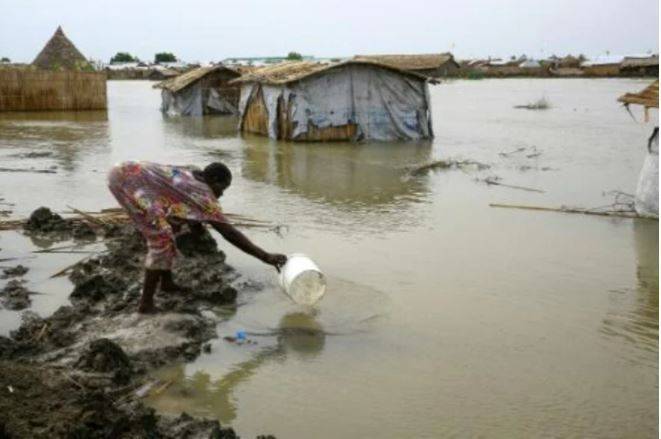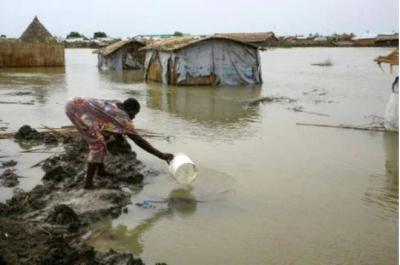Billions of dollars proposed at the "COP 26" conference will not be sufficient to help vulnerable nations cope with increasing droughts, floods, and heatwaves associated with climate change; instead, trillions of dollars will be necessary to finance these efforts, according to a draft UN report obtained by Agence France-Presse. The failure of wealthy countries to fulfill their promise to increase climate aid to impoverished nations to $100 billion annually starting from 2020 is one of the most contentious disputes at the nearing conclusion of the climate conference. However, this figure is minuscule compared to the actual costs of adapting to the devastating effects of global warming, as indicated in the draft report prepared by UN climate experts, which is set to be published in early 2022.
The 4,000-page report summary states that "adaptation costs are significantly higher than previously estimated" when facing urban flooding, food shortages, deadly heatwaves, and mass migrations, leading to a conclusion that "current projections for adaptation financing are inadequate given the expected scale of climate impacts." Global temperatures have risen by +1.1 degrees Celsius since the pre-industrial era, and they could rise beyond the targets set by the Paris Agreement, which aims to limit temperature increases to more than +2 degrees Celsius, ideally +1.5 degrees Celsius. However, as temperatures rise, the costs of protecting societies also increase, according to the Intergovernmental Panel on Climate Change (IPCC).
According to the draft report, the funding needed for climate adaptation could reach $1 trillion annually by 2050 under certain emissions scenarios. In a world with a +2-degree Celsius increase, adaptation costs for Africa alone could increase by "tens of billions" each year. "Adaptation is a huge blind spot," the IPCC report notes, which AFP has obtained an initial copy of, discussing the repercussions of climate warming. Meanwhile, experts and diplomats have begun assessing needs that will far exceed the $100 billion allocated to help countries reduce emissions and adapt to the impacts of warming.
Rachel Cleetus, director of climate and energy policy at the Union of Concerned Scientists, told AFP that a commitment which seemed significant in 2009 "has been completely surpassed" given the reality on the ground, stating that “when we talk about financing beyond 2025, it must be in the trillions.” Mohamed Adow, director of the climate and energy research center Power Shift Africa in Nairobi, sees adaptation as "a massive blind spot in the climate emergency."
The draft IPCC report emphasizes the urgent need for self-protection against the impacts of climate change, which will be severe even with a +1.5 degree Celsius rise, and also anticipates damage costs for every sector of society. Damages in Guangzhou, southern China, could exceed $250 billion each year with an additional 20 cm rise in sea level, without adaptation measures such as anti-flooding infrastructure. However, in a world where temperatures rise by two degrees Celsius, sea levels could double. Other coastal cities such as Mumbai could also fall victim to disasters of similar scale.
Flooding in Africa will contribute to a displacement rate of 2.7 million people annually by 2050 while crop yields, both in quantity and quality, will decline, increasing the risk of widespread malnutrition, with heatwaves also impacting health systems. Therefore, funding adaptation is akin to an investment to avoid future costs, according to the draft report. Brian O'Callaghan, a researcher at the University of Oxford, states that "investing in climate adaptation is somewhat like insurance against an inevitable event."
Mohamed Adow and others have called for a special report from the IPCC to assess global adaptation needs. The chief negotiator from the Dominican Republic, Max Puig, says, "We need an as objective as possible assessment of the costs of both adaptation and mitigation." Just a few days ago, the United Nations Environment Program estimated that adaptation financing needs could rise to $300 billion annually by 2030, and to $500 billion by 2050.
During "COP 26," the African Group, supported by emerging economies like China and India, urged developed countries to mobilize at least $650 billion annually for adaptation alone, starting from 2030. Meanwhile, Fiji and other islands proposed a much lower ceiling starting from 2025, according to Economy and Climate Change Minister Aiyaz Sayed-Khaiyum, who called on wealthy nations to recognize the emergency. He adds, "When we build a house, we cannot just build one wall every ten years and hope it will be a shelter for us. We need shelter now."




